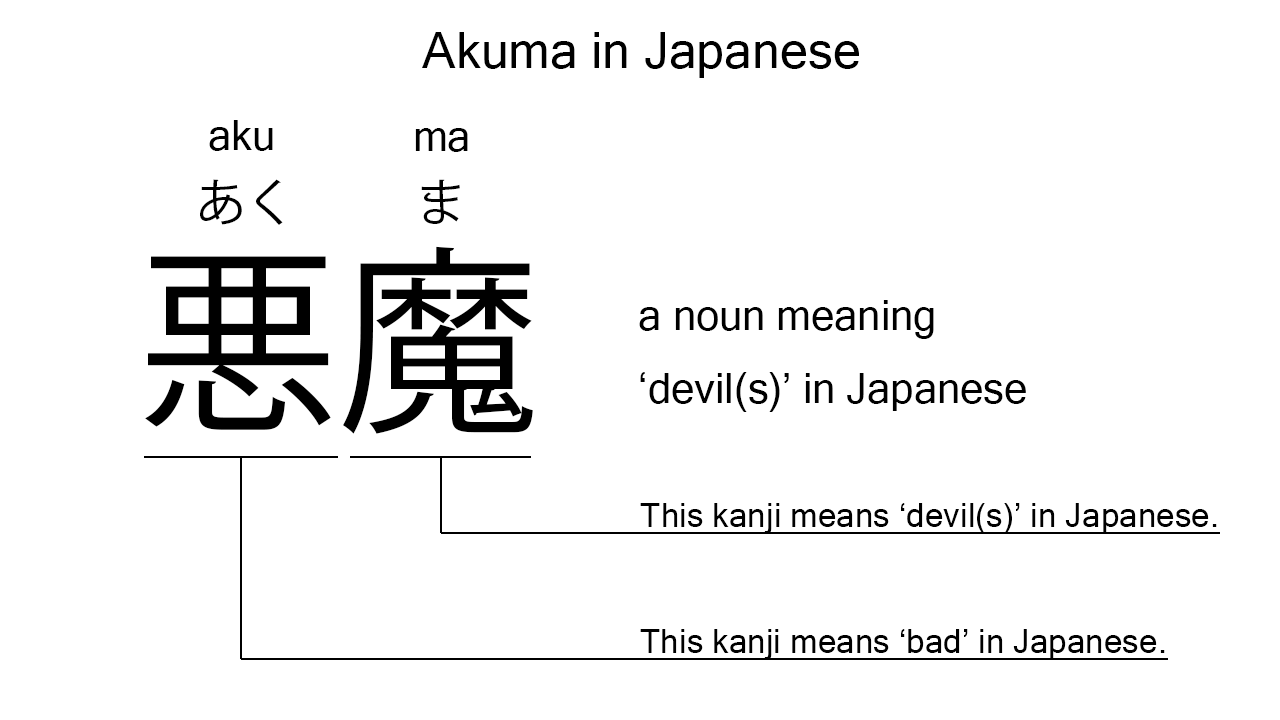What does “akuma” mean in Japanese?
Native speakers say akuma often to mean a ‘devil’ in Japanese. Perhaps, some Japanese learners know this word as it is sometimes used in Japanese movies, video games, novels, manga, anime, and the like. In this blog post, however, I will explain this word in detail based on its kanji expression. And also, I will explain how to use it through example sentences. My explanations would help Japanese learners understand akuma more clearly. Then, let’s get started!
Contents
Definition and meanings of “akuma”
Let me start with the definition and meanings of akuma.
- akuma – 悪魔 (あくま) : a noun meaning a ‘devil’ in Japanese. This can also work as plural. Learn more about Japanese plural. Depending on the context and situation, this can also mean a ‘demon’, ‘fiend’, or such.
Native speakers use this noun often to refer to a devil or devils in Japanese. In addition, they sometimes use this as a metaphor for someone who behaves like a devil. So, its usages are similar to those of the English nouns written above.
The definition and meanings are not that difficult, I think. To understand this noun more clearly, however, let me explain its kanji characters in detail, one by one.
Akuma in kanji
The kanji expression of akuma consists of the following two kanji characters:
- 悪 : a kanji character widely used to mean ‘bad’, ‘evil’, or such in Japanese.
- 魔 : a kanji character used to mean a ‘devil’, ‘demon’, or something supernatural.
These two kanji characters tell us that akuma literally means a ‘bad devil’ in Japanese. This literal interpretation is very close to the actual meanings. Devils are basically bad and evil.

When we meet new kanji expressions, we should check their kanji characters in detail to understand their meanings clearly and deeply. In many cases, kanji characters tell us a lot about the meanings of the expressions they form. Actually, here, we could get the better understanding of akuma through the detailed kanji check above.
So far, I’ve explained the definition and meanings of akuma together with its kanji characters. Then, let me explain how to use it through the example sentences below.
How to say “devil” in Japanese
kanojo wa akuma ni naru to it ta – 彼女は悪魔になると言った (かのじょはあくまになるといった)
She said that she would become a devil.
Below are the new words used in the example sentence.
- kanojo – 彼女 (かのじょ) : a pronoun meaning ‘she’ in Japanese.
- wa – は : a binding particle working as a case marker or topic marker. In the example, this works after kanojo to make the subject in the sentence.
- ni – に : a case particle used to say what someone or something becomes after a change or action. In this example, this is used after akuma to say what she would become.
- naru – なる : a verb meaning ‘to become’, ‘to turn’, ‘to get’, or such in Japanese.
- to – と : a case particle working as a quote marker. In the example, this works after akuma ni naru to indicate what she said.
- it – 言っ (いっ) : one conjugation of the verb, iu, which means ‘to say’ in Japanese. In the example, it has been conjugated for the better connection with its following word.
- ta – た : an auxiliary verb used after a verb, adjective, or auxiliary verb to make its past tense form. Probably, this is well known as a part of Japanese ta form. In the example, this is used after it to make its past tense form, it ta.
This is a typical usage of akuma. In this example, it works as the object and means a ‘devil’ in Japanese. I’ve never seen a person becoming a devil, but this kind of phrase is often used in Japanese movies, manga, anime, and the like.
Another example of “akuma”
akuma wa tenshi yori tsuyoi – 悪魔は天使より強い (あくまはてんしよりつよい)
Devils are stronger than angels.
Below are the new words used in the example sentence.
- tenshi – 天使 (てんし) : a noun meaning an ‘angel’ in Japanese. This can also work as plural.
- yori – より : a case particle working as a comparison marker. In the example, this works after tenshi to provide the target of the comparison. Word orders in Japanese and English are different, but the role of this case particle is similar to that of than in English.
- tsuyoi – 強い (つよい) : an i-adjective meaning ‘strong’ in Japanese.
This is another example of akuma. In this example, it works as plural to mean ‘devils’ in Japanese. When we want to mean a ‘devil’ or ‘devils’ in Japanese, anyway, this noun is always a very good option.
Summary
In this blog post, I’ve explained the definition and meanings of akuma in detail based on its kanji expression. And also, I’ve explained how to use it through the example sentences. Let me summarize them as follows.
- akuma – 悪魔 (あくま) : a noun meaning a ‘devil’ in Japanese. This can also work as plural. Depending on the context and situation, this can mean a ‘demon’ or ‘fiend’ as well. These two kanji characters literally mean a ‘bad devil’ in Japanese. This literal interpretation is very close to the actual meanings. Devils are basically bad and evil.
Hope my explanations are understandable and helpful for Japanese learners.
Leave a Reply